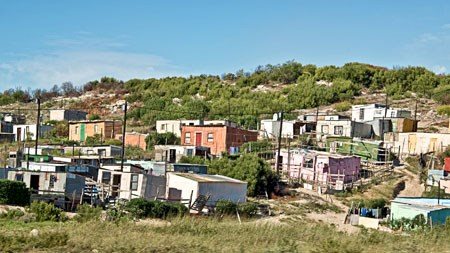|
We can now say with certainty that we’re beginning a downward movement in the rate cycle. Although this leaves the economy with room to manoeuvre, with regard to the economic slowdown, it means capital is expensive. With interest rates high and the banks refusing to lend, the economy’s cash strapped. Businesses and individuals alike are scrambling to horde cash. As a result, the “velocity of money” (the relationship between the level of economic activity with the money supply) has smashed through the ground as people wait to see where the bottom really is. With fewer transactions, real prices are beginning to stagnate. Vendors must offer more and more competitive prices in order to entice the consumer to part with their ever more valuable liquid cash. Dr Koos du Toit, CEO of P3 Investment Group, says: “At present, developers are desperate to sell units that were planned during the boom years and are now coming on stream. In a market that’s wallowing in the doldrums with few buyers, developers are dropping their prices in an attempt to move their stock.” According to Business Day, FNB figures showed residential house prices fell 6.9% last month from a revised rate of 4.7% in January. That’s nine months in the red, with an overall year long decline of 2%. “However, building costs are continuing to rise and once current stock has been sold, prices will rise again – and rise quickly,” claims du Toit. He believes this deflationary situation is unlikely to last past 2009. With the South African economy finally beginning to feel the effects of shrinking global demand – exports dropped 25% and imports rose by 6.9% according to recent SARS data – we’re sitting pretty. We have the luxury of being able to stimulate demand by lowering interest rates, to raise output. Developed countries now have rates so low, they’re at the point of actually having to pay people to take their money. This rate cut will no doubt add to medium-term inflationary pressure. But, the fact is, with short-term cash in short supply and real prices looking ever more attractive, if you can get and, more importantly, hold onto a large and valuable asset, you’ll reap capital gains benefits with the return of (even higher) medium- to long-term inflation. Remember, property investment isn’t a drive-by, shoot from the hip type investment. With transfer duties, Agents’ commission, conveyancing fees, mortgage valuation and inspection costs, shoe leather costs and a host of other hidden fees – at least stamp duty was abolished in 2004 – buying a property’s something that shows returns in the longer-term. Nevertheless, currently buying at, or at least on the way to, the bottom of the property market doesn’t only have good long-term capital gains rewards. The buy-to-let market, is also improving. With the slump in mortgage approvals, many potential buyers can’t secure finance. Even people, who are approved for a bond, are beginning to believe the doom and gloom sloshing around the media with regard to job security, global economic collapse and financial Armageddon. They’re holding off, waiting for things to start improving but, the fact is, by the time it does it’ll be too late. Their timidity is your victory. Though risk-adverse buyers are reducing the demand for housing sales and, in turn, the prices, they’ve increased demand for housing rentals. After all, people must live somewhere! This, of course, forces the price of rentals up and makes buyto-let even more attractive. Not only are you looking at excellent capital gains over the next five to ten years, in the short-term, if the market continues its slump you’ll continue getting your annuity income – and we all know the magic of compound interest. So you ask me, how can I lose? This is all too good to be true! The answer, if you want to lose money, is rent a property immediately. In fact, I’ll shortly have one for you if you’re interested. When it comes to maximising you rental gains, however, there are smart moves depending on your situation. If you’re looking for a buy-to-let arrangement: Rental on properties valued at under R500,000 are holding their own, despite the fact that those at the upper end are declining. “This is good for the smart BTL investor,” du Toit says, explaining that, from a longer-term perspective, it’s far more lucrative for an investor with, for example, R1.5m to purchase five entrylevel R300,000 units than one more upmarket R1.5m property. “In today’s market, the investor in the upmarket property will be able to command rental income of around R7,000 per month. However, each R300,000 property will rent out for around R2,500, resulting in total annuity income of R12,500 per month.” On the other hand, if you’re a first time buyer or currently renting, get out there, gear yourself up and buy the most awesome house you can find. Your mortgage payments will only come down with interest rates. Every month, you’ll be paying less. Inflation will spike, pushing up prices and especially the price of labour, which means higher salaries. And if you’re a business owner, don’t despair. We all know how great inflation can be, it’s a great excuse to inflate our margins. Either way, you‘ll be more able to pay easier and easier payments. And so, the wisdom: Buy now, if there’s any way you can, for never has so much been available so cheap to so few.
As published in issue 84 of |
News
 .
. 

